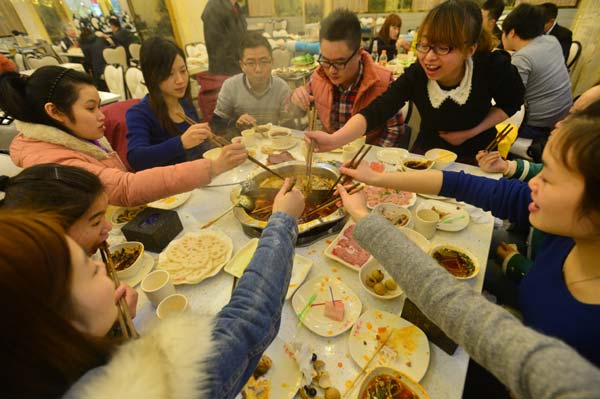Chongqing seeks State nod to protect hotpot heritage
Updated: 2014-01-25 14:23
By Luo Wangshu in Chongqing (China Daily)
|
||||||||
 |
|
Customers dine at a hotpot restaurant in Chongqing on Friday. Yang Fan / China Daily |
Chongqing hopes to have its iconic dish added to the Intangible Cultural Heritage List within the next few years, according to the Chongqing Hotpot Association.
The hotpot association is preparing files and documentation for the State-level application, said Li Dejian, director of the association.
Li, who announced the application on Thursday, said it will help protect the traditional cooking process, skills, utensils and dining style.
The State Council released a regulation on the eligibility requirements for the application for the State-level intangible cultural heritage in 2005.
The regulation said that "traditional handicraft skills and technology" would be able to apply for the heritage.
According to the association, China has some 50,000 Chongqing hotpot restaurants and there are more than 2 million people working in the industry in Chongqing.
Li said the application process won't be easy, but if Chongqing hotpot is recognized as a State-level intangible cultural heritage, it will benefit the cuisine's expansion throughout China and even the world.
Hotpot is a popular cuisine in which ingredients are placed in a simmering pot, and people eat at their leisure.
Chongqing hotpot is especially noted for its spiciness.
Su Xingrong, owner of Chongqing Sister Su Old Hotpot, a famous hotpot chain, told Chongqing Morning News that she is preparing to open a restaurant in New York.
"If Chongqing hotpot is named as a State intangible cultural heritage, it will help us expand our restaurants abroad," Su added.
In 2007, Chongqing was named "hotpot city" by the China Cuisine Association.
"Chongqing deserves the honor," said Nie Ganru, director of the Chongqing Hotpot Research Center.
According to Gao Yuan, a Chongqing native, "Hotpot is a lifestyle for me."
Even when Chongqing's summer heat reaches 40 degrees, "hotpot never walks away from my life," Gao said. "Nothing can stop me from eating hotpot."
Expats also savor Chongqing hotpot.
Kossi Vanessa, from Benin in West Africa, who studied in Chongqing for five years, still remembers the first time she had hotpot in October 2009.
"It is not only the taste that attracted me but also the way you eat it. Friends gather around a pot, cooking and dining together. It is so fun and interesting," she said.
Vanessa marked Oct 1 as her "hotpot anniversary".
"I have eaten hotpot every Oct 1 since 2009," she said.
Although there are no official records, Chongqing hotpot is believed to have originated as a common meal of boatmen and dock workers in the late 19th century.
When the Kuomintang government of Chiang Kai-shek established Chongqing as China's capital in 1937, the idea of hotpot was spread to the many migrants who lived in the city during World War II.
When they left Chongqing after the war, they took their love of the city's spicy hotpot with them.

 Gorgeous Liu Tao poses for COSMO magazine
Gorgeous Liu Tao poses for COSMO magazine
 Post-baby Duchess
Post-baby Duchess
 Victoria Beckham S/S 2014 presented during NYFW
Victoria Beckham S/S 2014 presented during NYFW
 'Despicable' minions upset Depp's 'Lone Ranger' at box office
'Despicable' minions upset Depp's 'Lone Ranger' at box office
 'Taken 2' grabs movie box office crown
'Taken 2' grabs movie box office crown
 Rihanna's 'Diamonds' tops UK pop chart
Rihanna's 'Diamonds' tops UK pop chart
 Fans get look at vintage Rolling Stones
Fans get look at vintage Rolling Stones
 Celebrities attend Power of Women event
Celebrities attend Power of Women event
Most Viewed
Editor's Picks

|

|

|

|

|

|
Today's Top News
US tariff investigation clouds solar panel products commerce
China, WEF cooperation 'important'
December worst air quality month of 2013
China 'can weather QE challenge'
1 student shot to death on US university campus
Wealthy Chinese eye priciest US home listing
Naval hotline urged to tackle conflict
Abe floats hawkish plan
US Weekly

|

|







